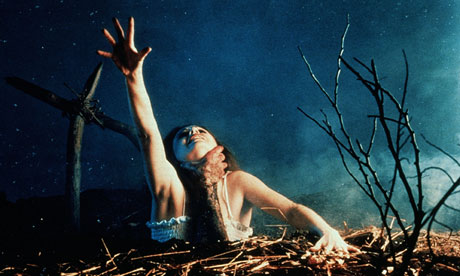
For a while now, so-called "literary" and "genre" fiction have been moving from outright opposition to a cautious rapprochement. Literary writers such as Jonathan Lethem, Donna Tartt and Michael Chabon increasingly deploy tropes and images from genre, while genre writers have upped their stakes considerably in terms of complexity, moral resonance and style. Sophie Hannah, Josh Bazell and Denise Mina have reinvented crime fiction; Charles Yu, Iain M Banks and M John Harrison have given a literary uplift to science fiction; while China Miéville, Jeff VanderMeer and Kelly Link have done the same for fantasy. But horror – the third aspect of "speculative fiction" – has had markedly less success. Yet it might be the genre most tractable to our contemporary concerns.
Horror has its classics – Mary Shelley and Bram Stoker, for example, though both are better known from celluloid than paper. (Victor Frankenstein, in the novel, doesn't use lightning to animate the creature; Dracula is perfectly able to walk abroad at noon on the page.) Horror has its early 20th-century pioneers – MR James and HP Lovecraft, both, in their own way, traumatised by modernity itself. Look at James's "Casting the Runes", in which an advertisement in an "electric tram" brings the first shudder, or how a doll's house, a mezzotint or hotel bedsheets can become eldritch. This is even clearer in Lovecraft: in "The Case of Charles Dexter Ward", he writes: "He tried to drive them out, and repeated the Lord's Prayer to himself, eventually trailing off into a mnemonic hodge-podge like the modernistic Waste Land of Mr TS Eliot." Futurism, cubism, Einstein, Pluto, non-Euclidean geometry … all are entry points for the unspeakable. On top of this, Lovecraft possesses less-than-palatable racial beliefs, which are unfortunately not an isolated phenomenon. A great many horror novels are reactionary, prurient and misogynistic. A gradual detoxification has taken place, but the genre still languishes.
I am fond of Stephen King's novels, but he regularly fails to nail the dismount: Under he Dome was claustrophobic and compelling, but the final reveal was bathetic and frustratingly arbitrary: it didn't seem to matter whether a demon or an alien was responsible. Granta recently devoted an issue to horror, with work by Will Self, Roberto Bolaño and Don DeLillo, but its relationship with supernatural horror was at times (especially in the extract from Paul Auster's memoir) oblique. There have been a few worthy attempts at modern horror: I'd recommend Robert Jackson Bennett's Mr Shivers and Will Elliott's The Pilo Family Circus. Good as they are, though, clowns and hobos are almost nostalgically fearful. Perhaps the most successful attempt was Mark Z Danielewski's House of Leaves, a book which self-consciously integrated the "hauntology" of French theory into an avant-garde puzzle box. The person who comes closest to a "new horror", to my mind, is Brian Evenson: Altmann's Tongue is far more frightening than anything Bret Easton Ellis could create.
Nevertheless, I'm convinced horror can raise its game. Our postmodern, capitalism-in-crisis, media-saturated world is ripe to describe it anew. Our very language seems to demand it. A mortgage, literally, is a death grip. Negative equity means being haunted by your own house. Corporations have legal personhood: they can be held responsible for criminal actions and claim "human" rights, but ironically they have no body. PR and political spin are referred to as "dark arts". Your computer can be a zombie, "possessed" by a Trojan virus. Charley Douglass started to make canned laughter in 1953 – and it's still in use. Every episode of Friends is accompanied by the cachinnation of the dead.
Theodor Adorno, in Minima Moralia, wrote that "just as in a short-circuit, sparks are scattered, in reality one delusion communicates like lightning with another. The points of communication are the overwhelming confirmations of persecution fantasies which, mocking the invalid with being right, only plunge him deeper into them. The surface of life then at once closes together again, proving to him that things are not so bad and he is insane. He subjectively anticipates the state where objective madness and individual helplessness merge directly, as when fascism, a dictatorship by persecution maniacs, realises all the persecution fears of its victims. Whether exaggerated suspicions are paranoiac or true to reality, a faint echo of the turmoil of history, can therefore only be decided retrospectively. Horror is beyond the reach of psychology." Might this be a starting point for the redemption of the horror genre?

